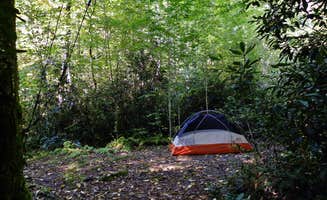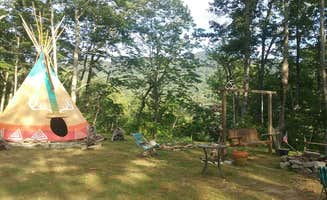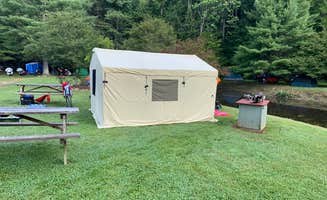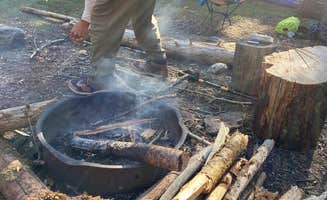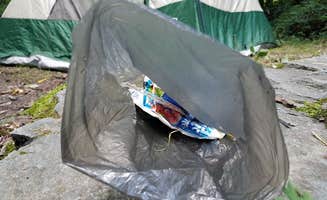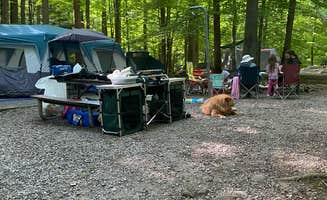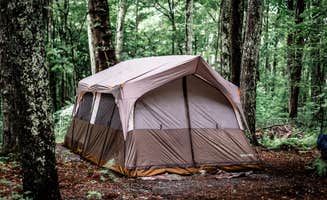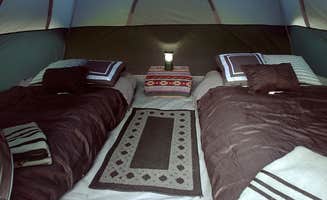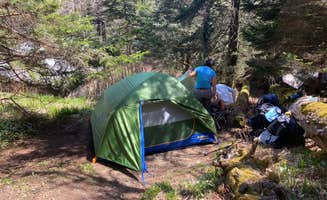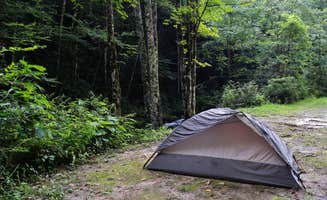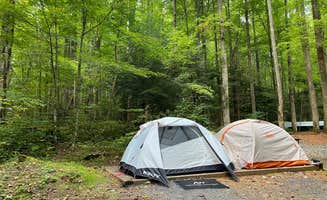Tent camping near Lake Junaluska, North Carolina puts visitors within 40 miles of the Tennessee-North Carolina border region that receives between 55-85 inches of annual rainfall, creating lush forest conditions around campgrounds. The area sits at elevations ranging from 1,700 to 6,000 feet, resulting in temperature variations of 10-15 degrees between valley campgrounds and mountain sites. Many sites are positioned along creeks and rivers that offer natural white noise for sleeping.
What to do
Hike to mountain summits: Mount Sterling campsite offers access to its historic fire tower with panoramic views. "One highlight of our stay was the old firetower at the site. While the climb can be daunting for those with a fear of heights, the payoff at sunrise and sunset is truly worth it, with views stretching for miles in all directions," notes Asher K.
Fish in stocked mountain streams: The Harmon Den Area in Pisgah National Forest provides excellent fishing opportunities. "A wildlife officer came through our camp with a fishnet full of trout to stock the creek. She asked us if we brought our fishing poles," shares Myron C., indicating regular stocking happens in this area.
Soak in mineral hot springs: After hiking, Hot Springs Campground provides access to natural mineral waters. "Loved the spa. Amazing views open air hot tubs. Great hiking across the river and cute little town to explore," reports Tra C. The campground sits right along the river with the hot spring spa just across the street.
Explore historic structures: Along trails to tent campsites near Lake Junaluska, you can find preserved buildings. At Site 40, "the trail itself passes by a house and a spring house that were built before the land was turned into a national park. You can actually go inside the house and explore its rooms," explains Myron C.
What campers like
Natural sound buffers: The rushing water at tent camping areas creates peaceful sleeping conditions. At Laurel Gap Shelter, one camper appreciated "a pipe set up that directs creek water for purification" while noting the campground's "multiple fire rings and great spots for tents that are all spread out."
Less crowded campgrounds: Smaller, more remote tent sites offer better solitude. "This location is a great choice for anyone who wants to visit GSMNP while avoiding some of the crowds. This campground rarely fills up, allowing for the opportunity to pick your site when you get there," writes Janine B. about Cosby Campground.
Early arrival advantages: Morning arrivals can secure the most desirable tent pads. "Arriving early paid off for us, as we secured a large area near the firetower. However, most sites come equipped with fire pits and clear areas, providing plenty of options throughout the campsite," notes Asher K. about camping at Mount Sterling.
Wildlife encounters: Natural animal sightings add to the camping experience. One camper at Laurel Gap Shelter mentioned, "One unforgettable morning, we were greeted by a friendly deer that sauntered by, offering us a charming 'good morning' as it grazed peacefully on the surrounding grasses."
What you should know
Bear safety is mandatory: All food must be properly stored when tent camping near Lake Junaluska. At Big Creek Campground, Katrin M. notes, "For running water you can use water spigots that are around the campground," but reminds that "Due to the dogs we just walked the gravel road," as pets aren't allowed on many trails in the national park.
Weather preparedness: Mountain elevations can create unexpected conditions. "Sitting atop the summit, this campsite offers unparalleled vistas that are nothing short of breathtaking. But the elevation also means colder and windier conditions, so warm gear is a must, especially during the evenings," warns Asher K. about Mount Sterling.
Backcountry permits: Most tent sites require advance reservations. A camper at Tricorner Knob Shelter explains: "As we arrived at this Appalachian Trail shelter, it became evident that it was bustling with AT thru-hikers who were embarking on their journey northward. Unfortunately, the shelter and its surrounding camping areas were not able to accommodate the influx of hikers."
Water availability varies: Some sites require hiking to water sources. At Mount Sterling, "Water is available, but remember to bring your purification equipment, as the water source is about a 10-minute hike from the campsite."
Tips for camping with families
Choose established campgrounds: Facilities make family camping easier. The Blue Ridge Motorcycle Campground surprisingly welcomes families despite its name. "This was the first 'motorcycle' campground I ever stayed at. I was expecting loud parties, drunkenness, cruisers blasting loud open pipes. I was pleasantly surprised that this was a very family friendly atmosphere," shares Brian F.
Consider campsite access distance: Some tent sites require carrying gear. According to Katrin M., at Big Creek Campground "You cannot park your car right on the campsite. There is a parking lot and you need to carry your gear in. It's about 100 feet to the sites."
Watch for poison ivy: Natural hazards require vigilance with children. At Harmon Den Area, Myron C. noted, "There was also lots of poison ivy, so that was another concern I had about my grandson running freely."
Look for educational opportunities: Ranger programs provide learning experiences. At Cosby Campground, Janine B. mentions, "On Fridays they have special Ranger programs. We were lucky enough to learn about moon-shining from guys on the moonshiner TV show. It was very interesting!"
Tips from RVers
Limited hookup options: Most tent campsites near Lake Junaluska offer minimal RV services. In Hot Springs Campground, Karen P. found "Dirt site by the River all hook ups. They also have small cabins and tent sites. Walking distance to trails and town."
Access road limitations: Forest roads can be challenging for larger vehicles. Timothy warns about Harmon Den Area: "Definitely not a road for RV's or Travel Trailers, or the faint of heart, as it's very narrow with a clearance of about 8-10 feet in several places. There are also some significant ruts and holes. I would recommend a 4x4 high clearance vehicle."
Consider tent-only campgrounds: Some areas explicitly prohibit RVs. At Tricorner Knob Shelter, Christina Z. mentions, "My first shelter experience, and I really enjoyed it. Most times, the people you are huddled with are what make or break a shelter stay, and I was very lucky to have awesome campmates."
Smaller RVs work best: Compact camping vehicles provide more options. Dakota R. at Blue Ridge Motorcycle Campground found, "Me and my party of 6 stumbled upon this Gem after we had made reservations at another site that was extremely sketchy on Labor Day weekend so we called around and heard BRMC had some space."


